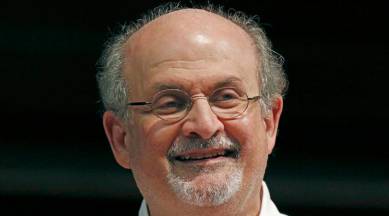- Law & Society
- No Comment
How British Author Salman Rushdie Was Stabbed On Stage

— The British author, Rushdie has been under religious decree, calling for his death by Iranian revolutionary leader Ayatollah Ruhollah Khomeini.
British author Salman Rushdie, whose writings have made him the target of Iranian death threats, was attacked and stabbed in the neck at a literary event on Friday in western New York state.
Agency Reports quote Police as saying that a male suspect rushed the stage and stabbed Rushdie several times just before he delivered a lecture in Chautauqua, Western New York, United States.
The attack happened at about 11 a.m., shortly after Rushdie, 75, took the stage for a lecture at the Institution.
He was rushed by helicopter to a local hospital, police said, adding that his condition was not known.
New York governor Kathy Hochul said Rushdie was alive, and hailed him as “an individual who has spent decades speaking truth to power.”
“We condemn all violence, and we want people to be able to feel (the) freedom to speak and to write truth,” she said
.
Police gave no details about the suspect’s identity or any probable motive.
Social media footage showed people rushing to Rushdie’s aid and administrating emergency medical care. The interviewer also suffered a head injury in the attack.
Rushdie, 75, was propelled into the spotlight with his second novel “Midnight’s Children” in 1981, which won international praise and Britain’s prestigious Booker Prize for its portrayal of post-independence India.
But his 1988 book “The Satanic Verses” brought attention beyond his imagination when it sparked a fatwa, or religious decree, calling for his death by Iranian revolutionary leader Ayatollah Ruhollah Khomeini.
The novel was considered by some Muslims as disrespectful of the Prophet Mohammed.
Rushdie, who was born in India to non-practicing Muslims and today identifies as an atheist, was forced to go underground as a bounty was put on his head — which remains today.
He was granted police protection by the government in Britain, where he was at school and where he made his home, following the murder or attempted murder of his translators and publishers.
He spent nearly a decade in hiding, moving houses repeatedly and being unable to tell his children where he lived.
Rushdie only began to emerge from his life on the run in the late 1990s after Iran in 1998 said it would not support his assassination.
Now living in New York, he is an advocate of freedom of speech, notably launching a strong defence of French satirical magazine Charlie Hebdo after its staff were gunned down by Islamists in Paris in 2015.
The magazine had published drawings of Mohammed that drew furious reactions from Muslims worldwide.
Threats and boycotts continue against literary events that Rushdie attends, and his knighthood in 2007 sparked protests in Iran and Pakistan, where a government minister said the honor justified suicide bombings.
The fatwa failed to stifle Rushdie’s writing and inspired his memoirs “Joseph Anton,” named after his alias while in hiding and written in the third person.
“Midnight’s Children” — which runs to more than 600 pages — has been adapted for the stage and silver screen, and his books have been translated into more than 40 languages.
Credit: AFP and The New York Times
Pix: The Indian Express
